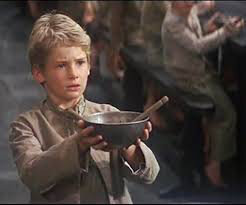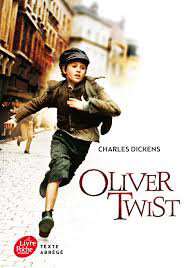19th century inequalities : Oliver Twist
Oliver Twist : a book about social inequalities
The 19th century was the century of denunciation of social inequalities in Europe. With for instance Realism and Naturalism in France (Balzac, Maupassant, Flaubert, Zola...), or even sometimes more Romantic authors (Hugo’s Les Misérables) and some of the victorian literature in Great Britain, many writers decided to stand for the cause of the poorest. It is the case of Charles Dickens with many of his pieces, but the most famous may be Oliver Twist. As we follow the story of the boy since he was born until, maybe, he is 12, we realize the horrors he goes through are not exceptional : many children lived these kinds of lives during the Victorian Era. This leads us to ask, how does Charles Dickens denounce social inequalities through Oliver and the other characters ?
Oliver asking for more food : “please sir (...), I want some more.” (by J. Mahoney)
Oliver is depicted as strong and fragile at the same time. He stays pure despite all the events that happen to him (being an orphan, abuses, violence, injustices, hunger, poverty, grief…), the cruelty of almost all the adults (the representants of society, the people who hire him or the criminals) and his absolute lack of love. The born-orphan, thanks to his good nature, can not be corrupted although he is taken away by a gang of pickpockets. He is too young and naive to have an intellectual sense of the word “value”, but deep inside he has his values and so his soul can not be ruined by the world. Even though such a character may or may not be realistic, Oliver is a very likeable character, which the readers want to help and to protect. At a time when people paid very little attention to the aching children of which they crossed the path every single day, having them read this story permitted to raise their awareness about this matter and to make them actually see these kids, make them want to help them, make them wish their fate could be different.
Many lives are broken throughout the novel, and no one escapes from his condition. The fate of Nancy, particularly shocking, shows that it could have ended way worse for the other characters and how terrible the poorest’s lives are. The only reason why Rose and Oliver get to have happy endings is because, hereditary, they are rich.
Poverty is fatality. The society won’t let any poor rise up and get out of the mud. That is what needs to be changed, for Dickens. With his books, and alongside other artists, he allowed consciences to change. Laws have been voted, and although inequalities still take place in Great Britain, the fate of many has improved.
This is one of the uses of literature. Art may not have a direct impact on society, but it changes people’s minds, and people’s minds transform the society.
Roman Polanski’s adaptation of Oliver Twist (2005)
Anne-Gabrielle Marquet (1L2)





/https%3A%2F%2Fassets.over-blog.com%2Ft%2Fcedistic%2Fcamera.png)
/https%3A%2F%2Fstorage.canalblog.com%2F21%2F33%2F1624309%2F129056081_o.jpeg)
/https%3A%2F%2Fstorage.canalblog.com%2F65%2F26%2F1624309%2F128946767_o.jpeg)